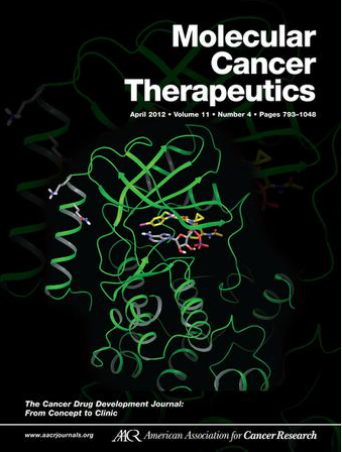ASCL1 restrains ERK1/2 to promote survival of a subset of neuroendocrine lung cancers.
IF 5.3
2区 医学
Q1 ONCOLOGY
引用次数: 0
Abstract
The transcription factor achaete-scute complex homolog 1 (ASCL1) is a lineage oncogene that is central in growth and survival of the majority of small cell lung cancers (SCLC) and neuroendocrine non-small cell lung cancers (NSCLC-NE) that express it. Targeting ASCL1, or its downstream pathways, remains a challenge. SCLCs and NSCLC-NE that express ASCL1 exhibit relatively low ERK1/2 activity, in dramatic contrast to NSCLCs in which the ERK pathway has a major role in pathogenesis. ERK1/2 inhibition in ASCL1-expressing lung tumor cells revealed down-regulation of ERK1/2 pathway suppressors SPRY4, SPRED1, DUSP6, and the transcription factor ETV5, which regulates DUSP6. CHIP-seq demonstrated that these genes are bound by ASCL1. Availability of a pharmacological inhibitor directed mechanistic studies towards DUSP6, an ERK1/2-selective phosphatase, in a subset of ASCL1-high NE lung tumors. Inhibition of DUSP6 increased active ERK1/2, which accumulated in the nucleus. Pharmacologic and genetic inhibition of DUSP6 reduced proliferation and survival of these cancers. Resistance developed in DUSP6 KO cells, indicating a bypass mechanism. Although targeting ASCL1 remains a challenge, our findings suggest that expression of ASCL1, DUSP6 and low phospho-ERK1/2 identify neuroendocrine lung cancers for which DUSP6 may be a therapeutic target.ASCL1抑制ERK1/2,促进神经内分泌肺癌亚群的存活。
转录因子Achaete-scute复合体同源物1(ASCL1)是一种系癌基因,在大多数表达它的小细胞肺癌(SCLC)和神经内分泌性非小细胞肺癌(NSCLC-NE)的生长和存活中起着核心作用。靶向 ASCL1 或其下游通路仍然是一项挑战。表达ASCL1的SCLC和NSCLC-NE的ERK1/2活性相对较低,这与ERK通路在发病机制中起主要作用的NSCLC形成鲜明对比。在表达 ASCL1 的肺肿瘤细胞中抑制 ERK1/2 发现,ERK1/2 通路抑制因子 SPRY4、SPRED1、DUSP6 和调控 DUSP6 的转录因子 ETV5 下调。CHIP-seq表明,这些基因与ASCL1结合。一种药理抑制剂的出现将机理研究引向了 ASCL1 高 NE 肺肿瘤亚群中的 DUSP6(一种 ERK1/2 选择性磷酸酶)。抑制 DUSP6 会增加活性 ERK1/2,使其在细胞核中积聚。药物和基因抑制 DUSP6 可减少这些癌症的增殖和存活。DUSP6 KO细胞产生了抗药性,这表明存在一种旁路机制。尽管以ASCL1为靶点仍是一个挑战,但我们的研究结果表明,ASCL1、DUSP6和低磷酸化ERK1/2的表达确定了神经内分泌性肺癌,DUSP6可能是其治疗靶点。
本文章由计算机程序翻译,如有差异,请以英文原文为准。
求助全文
约1分钟内获得全文
求助全文
来源期刊
CiteScore
11.20
自引率
1.80%
发文量
331
审稿时长
3 months
期刊介绍:
Molecular Cancer Therapeutics will focus on basic research that has implications for cancer therapeutics in the following areas: Experimental Cancer Therapeutics, Identification of Molecular Targets, Targets for Chemoprevention, New Models, Cancer Chemistry and Drug Discovery, Molecular and Cellular Pharmacology, Molecular Classification of Tumors, and Bioinformatics and Computational Molecular Biology. The journal provides a publication forum for these emerging disciplines that is focused specifically on cancer research. Papers are stringently reviewed and only those that report results of novel, timely, and significant research and meet high standards of scientific merit will be accepted for publication.

 求助内容:
求助内容: 应助结果提醒方式:
应助结果提醒方式:


